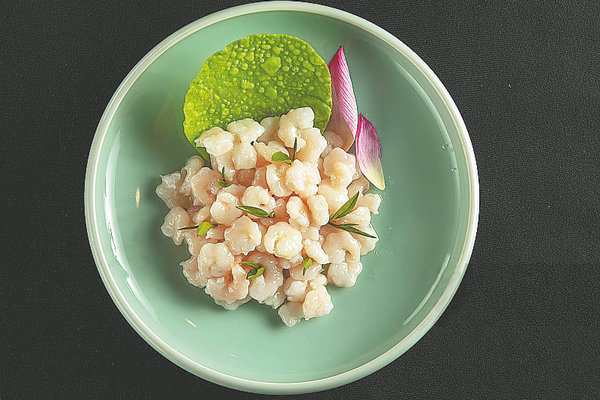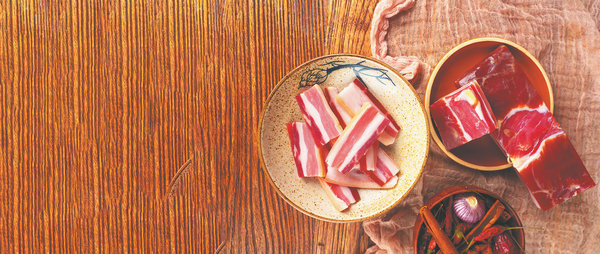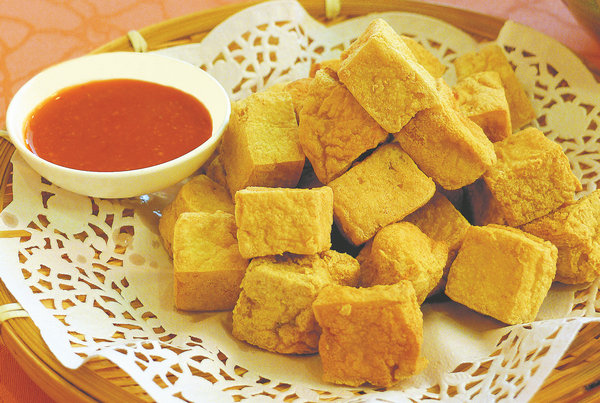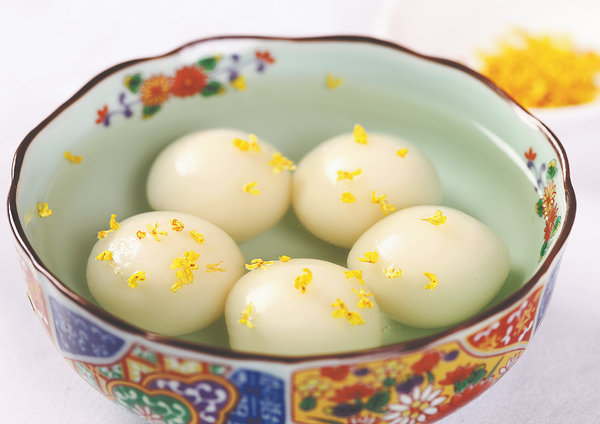Different areas in Zhejiang boast specific and famous dishes, such as xihu cuyu (West Lake fish in vinegar gravy) from Hangzhou. [Photo by Chen Zhongqiu/For China Daily/China Daily]
Steeped in history and renowned for its serene landscapes, Zhejiang province entices visitors to explore its vibrant culinary offerings, which offer a diverse blend of flavors and refreshing sensations.
Those who visit Hangzhou, capital of Zhejiang, will most likely visit the famed West Lake, and a dish bearing the lake's name, xihu cuyu (West Lake fish in vinegar gravy) is an iconic choice to accompany the journey.
As its name implies, a grass carp is soaked in vinegar sauce with a dark red hue, resulting in a tender texture with a blend of sweet and sour flavors, which can be a novel experience for the first-timers.
Not only does the dish enjoy a reputation for its connection with the West Lake, it also has a rich history.
It is said to have been invented during the Song Dynasty (960-1279), and its current name can be traced back to the Qing Dynasty (1644-1911), with poets lauding its unique flavors.
Zhejiang's cuisine is also inseparably linked to its tea culture, with Longjing tea leading the way.
This noteworthy green tea, grown in the lush mountain plantations near the West Lake, among other parts of Zhejiang, is known for its history of more than a millennium and was selected as a tribute drink to ancient emperors.

Different areas in Zhejiang boast specific and famous dishes, such as stir-fried shrimp with Longjing tea from Hangzhou. [Photo by Chen Zhongqiu/For China Daily/China Daily]
The stir-fried shrimp with Longjing tea offers connoisseurs an enriched experience outside of just sipping Longjing tea while appreciating the region's natural beauty.
Using freshly brewed Longjing tea to stir-fry the peeled shrimp gives the dish a unique flavor and delicate green tea fragrance.
Another famed dish, dongpo rou (Dongpo Pork), further proves Zhejiang's established culinary tradition with its combination of color, aroma and flavor, as well as having a captivating backstory.
This classic dish, associated with the great poet Su Dongpo (1037-1101), otherwise known as Su Shi, of the Song Dynasty, can also be found in other parts of China, including Jiangsu and Sichuan provinces.
Legend has it that when Su arrived in Hangzhou to serve as an official, the region was suffering from heavy downpours.
He quickly took action and organized laborers to construct embankments and open up dredges, so that the floodwaters would recede.

Different areas in Zhejiang boast specific and famous dishes, such as Jinhua drycured ham. [Photo by Chen Zhongqiu/For China Daily/China Daily]
To express their gratitude for Su's work, Hangzhou gifted him with a large amount of pork.
Su instructed his family members to cut the meat into small cubes, braise it in brown sauce, and then distributed the dish to the laborers, hence the origin of Dongpo Pork.
In May, the Michelin Guide released its first restaurant selection for Hangzhou, making it the fifth Chinese mainland city to have its own Michelin restaurant selection, following Shanghai, Guangzhou in Guangdong province, Beijing and Chengdu in Sichuan province.
Six restaurants were awarded one Michelin star and another 45 were included in the guide.
Among them, many specialize in authentic Zhejiang cuisine, or serve the traditional dishes with a modern twist.
Beyond formal dining, the streets and markets of cities in Zhejiang offer myriad tantalizing options and a more casual tasting experience to get in touch with the local culture.

Different areas in Zhejiang boast specific and famous dishes, such as deep-fried stinky tofu from Shaoxing. [Photo by Chen Zhongqiu/For China Daily/China Daily]
Deep-fried stinky tofu from the city of Shaoxing, rice dumplings from Ningbo, or the dingsheng gao — bearing the propitious meaning of victory — take an impromptu turn on the streets, and one might run into a new flavor that lingers on the palate.
Some of Zhejiang's food specialties, because of their rich history, refined production technique and widespread reputation, have been rated as a national-level intangible cultural heritage.

Different areas in Zhejiang boast specific and famous dishes, such as rice dumplings from Ningbo. [Photo by Chen Zhongqiu/For China Daily/China Daily]
The Jinhua dry-cured ham, for example, demonstrates the exceptional manufacturing technique in ham curing, perfected over the course of history. With carefully selected pork leg and a complex set of processes that have specific temperature requirements, the drycured ham enjoys a stellar reputation both at home and abroad.
The ancient Chinese proverb goes: "People value food as much as heaven".
Perhaps the Zhejiang cuisine, from iconic dishes to street food delights, can offer visitors an unconventional perspective into both the province's people and culture, which are just as diverse, exquisite and refreshing.